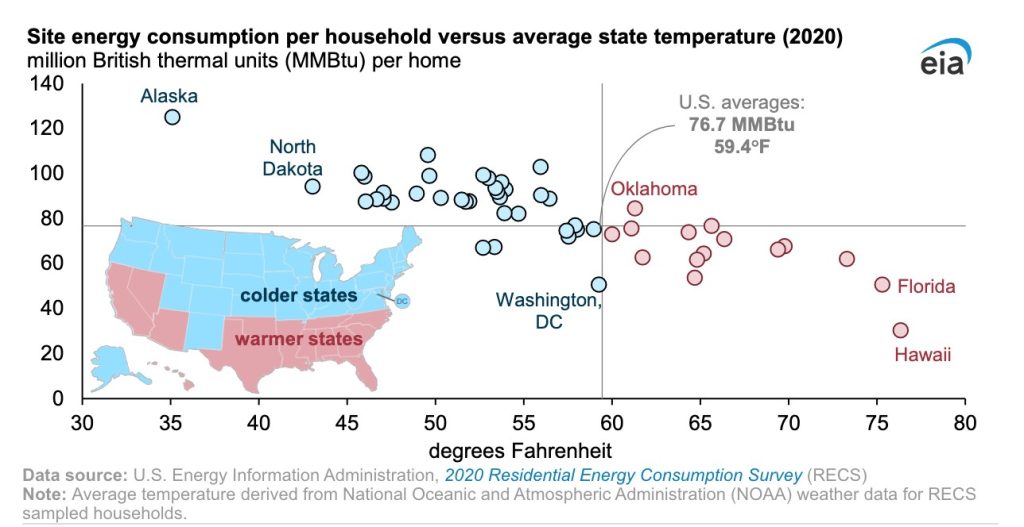
The US Energy Information Administration’s (EIA) Residential Energy Consumption Survey revealed which states use the most site energy – that is, the amount of energy that enters a home.
What’s site energy?
Site energy as defined by the EIA includes electricity from the grid, electricity from onsite solar panels, natural gas, propane, and fuel oil. With respect to electricity, site energy doesn’t account for the losses associated with the conversion of primary fuels to electricity or the electrical losses in the transmission and distribution system.
Site energy consumption is a combination of the energy consumption from all energy end uses in a home, including seasonal end uses such as space heating and cooling, and non-seasonal end uses such as cooking and consumer electronics.
Consumption in individual households can vary widely depending on the efficiency of the heating and cooling equipment.
Who’s using the most site energy?
The survey collected energy-use data for 18,496 households, the largest sample in the program’s history. The EIA found that households in colder climates, where space heating equipment is used more intensely, tend to consume more site energy than households in warmer parts of the US.
Of the 15 states with average annual temperatures above the national average – 59.4F – the average households in every state except Oklahoma used less energy than the national average.

Hawaii was the warmest state, using an average of 30.3 MMBtu per household, when the survey was released in 2020. Only 6% of homes in Hawaii were heated, and just 57% of households used air-conditioning (AC) equipment.
Alaska was the coldest state, using an average of 125.1 MMBtu per household in 2020. In Alaska, 99% of homes used space-heating equipment, while only 7% of homes used AC equipment.
Top comment by Johnny Vector
Wow, the mid-Atlantic, where I live, has an average household usage of 89 MBTU/yr, which is equivalent to 26,000 kWh/yr. I know how much I use because I come very close to breaking even on solar, and I generate (and use) about 17,000 kWh/yr. But that includes most of my driving too. And yes, I'm 100% electric, other than 3 or 4 bags of charcoal I use for grilling each year.
My house is fairly tight (Energy Star certified), but I have a wood fireplace which is not great for tightness, and the windows are low-e well-sealed but 6 years old now and only builder-grade so they're not as tight as they could be. And no heat recovery ventilator. And the R-22 walls are now basically what the county requires. So there's clearly a lot to be gained as the housing stock becomes newer, built to modern codes.
Although site energy consumption is determined by many factors, including varying household behaviors, building construction, and heating and cooling equipment efficiency, the way that space heating and cooling is used in the US leads to a correlation between average site energy consumption and average temperature.
Read more: The US’ largest clean energy infrastructure project is kicking off construction
If you’re considering going solar, it’s always a good idea to get quotes from a few installers. To make sure you’re finding a trusted, reliable solar installer near you that offers competitive pricing, check out EnergySage. EnergySage is a free service that makes it easy for you to go solar. They have hundreds of pre-vetted solar installers competing for your business, ensuring you get high quality solutions and save 20 to 30% compared to going it alone. Plus, it’s free to use and you won’t get sales calls until you select an installer and you share your phone number with them.
Your personalized solar quotes are easy to compare online and you’ll get access to unbiased Energy Advisors to help you every step of the way. Get started here.
FTC: We use income earning auto affiliate links. More.



Comments